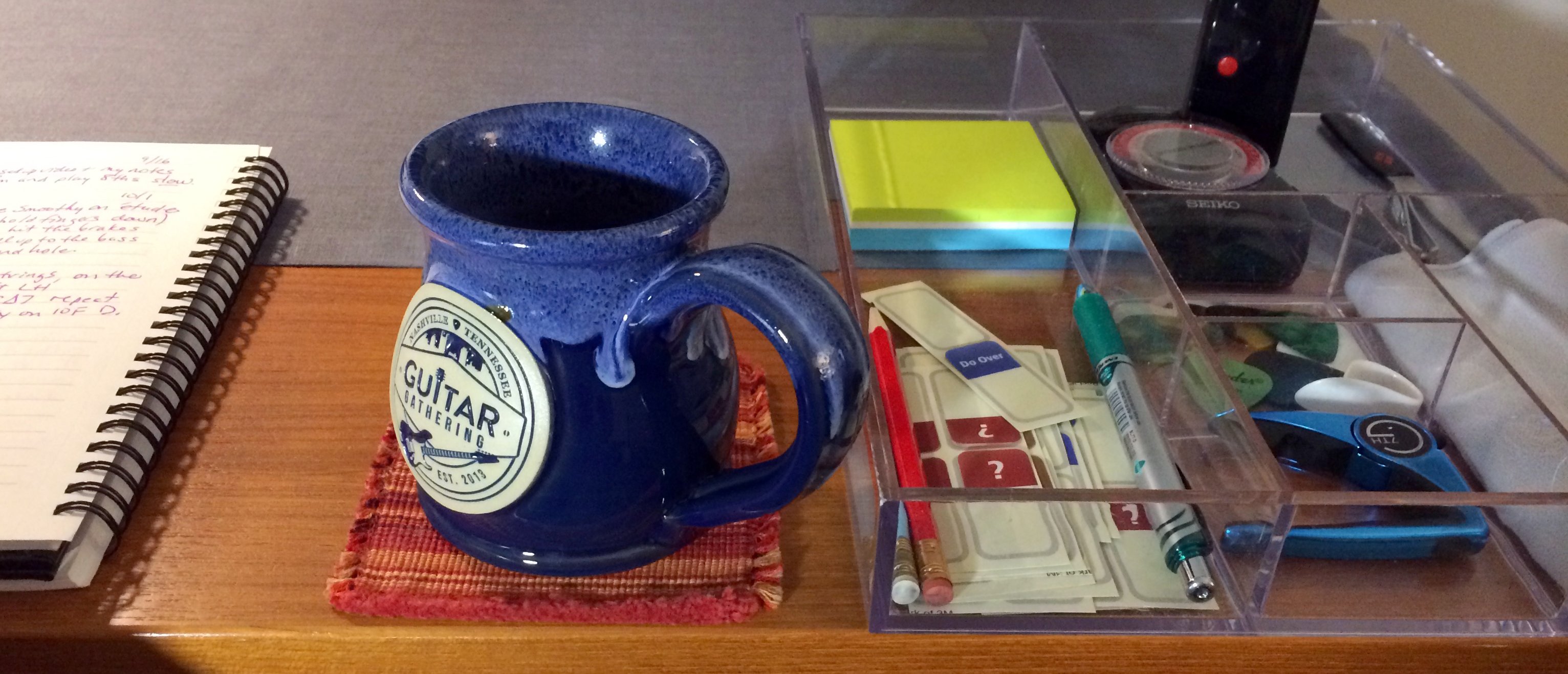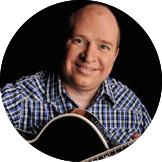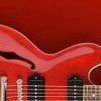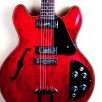-
Posts
919 -
Joined
-
Last visited
-
Days Won
255
Content Type
Profiles
Forums
Gallery
Events
Articles
Blogs
Downloads
Community Map
Everything posted by DianeB
-
@Dave White Wonderful! And $20,000 for IOJ will bring a lot of joy into the world!
-
From The Guardian: "The road will kill you": Why older musicians are cancelling tours "Health concerns have caused a number of high-profile singers to quit the road but what will it all mean for the industry at large?"
-
untilLive Lesson with Steve Krenz from "an undisclosed isolation unit somewhere in Nashville", TN 7:00 Central Time: Finally Learning the Fretboard, an interactive workshop on learning the notes on the neck, with Q&A on the recent triad series of lessons.
-
I used Acrobat to combine the three triad PDFs (major, minor, and sevenths) into a single 5.6 Mb file, attached here for convenience. Triads Book(M-m-7).pdf
- 9 replies
-
- 10
-

-

-
@Daveguitar_61 If I understand your question correctly, yes, in a harmonized B natural minor scale the fifth is a v minor (F#m = F#-A-C#). But in the context of this example, we have a specific form, that of "Hotel California," with a descending B-A#-A-E line. That specific fall requires F# major (F#-A#-C#). Felder used a common flamenco (but not pop) progression. Its working title was "Mexican Reggae". Of course, Henley and Walsh shaped it into the rock standard we all know, but in later years, the band returned it to its acoustic, flamenco-flavored origins.
-
Hello, @Preetam, and welcome to the forum! I will assume you are just starting out with guitar. I hope you will take some time to learn about good posture and the ergonomics of playing guitar. The Musician's Way website is a good start. The object is to be aware of your entire body, and which muscles are in use for supporting weight, providing balance, and musical control. For now, think of your arm, including the shoulder, as an extension of your hand. The thumb normally provides stability while the fretting fingers apply the minimum required force. The wrist, elbow, upper arm, and shoulder should distribute the weight. The fretting fingers should touch the strings on their tips, not their pads. And this is all easier said than done!
-
Recently I’ve read some new books that might be of interest. These are oriented toward general self- or skill improvement, not necessarily music, although music skills are well represented. I found valuable nuggets in each. One of these might perk up your practice, as they did for mine. If you enjoyed the late George Leonard’s Mastery (1991), I encourage you to follow up with his equally concise companion volume, The Way of Aikido (1999). It provides the backstory to the aikido lessons in Mastery, and we learn what it’s like to become a newly minted black belt. (Hint: You start over.) From the NYT best seller list we have James Clear’s Atomic Habits (2018) — build good habits and break bad ones. Chapter One alone is worth the price. Also well reviewed is Peak: Secrets from the New Science of Expertise (2017) by Anders Ericsson and Robert Pool. And we have a pair from co-authors Brad Stulberg and Steve Magness, who have made new careers of studying the research on performance: Peak Performance: Elevate Your Game, Avoid Burnout, and Thrive with the New Science of Success (2017). In writing that book, they discovered that burnout was a subject in itself. They tackle the issues that arise specifically from following your passion in The Passion Paradox (2019). To borrow author Tom Peters’ phrase from a related context, “there is an eerie similarity of language” among all these authors’ findings and recommendations. I heard the same themes echoing again and again: Deliberate practice. Consistency. Self-awareness. Tradeoffs. Challenge. Warnings abound: The object of your passion can consume and crush you. Feedback is healthy, but pursuing external validation is a fool’s errand. Rest — short, medium, and long term — is a biological necessity for growth. The principles apply to learning guitar or improving at almost anything. The links above go to Amazon, but first check your local library. Enjoy!
-
@kenneth It's good that you're mindful of pick direction. The choice depends to some degreee on what's happening in the music: alternating bass? string skipping? and such. At this stage I'd encourage you to use alternate picking (up-down-up-down) as much as possible. It's hard to acquire speed if one's picking is all up or downstrokes.
-

Article -🤭 Do We All Hate Our Own Guitar Playing?🤔
DianeB replied to Nutty 1's topic in Guitar Open Talk
Thanks, Mandy. On this theme, give a listen to Brent Vaarstra's podcast on Learn Jazz Standards: "Why I Stopped Hating My Playing". You can skip over the initial announcements to about 4:00, where you will hear the sound of me taking a bucket of cold water squarely in the face. Enjoy! I have to towel off, again. -
@josev The key of G major (or E minor) is indicated on the treble clef with a single sharp on the F line. All notes on the F line are played F#, because that is what the interval pattern of a major scale (M2 - M2 - m2 - M2 - M2 - M2 - m2) requires if the tonic (first pitch on the scale) is G. So a G major scale is: G - A - B - C - D - E - F# - G. If a natural sign appears in front of an F in that piece of music, the sharp is canceled for the duration of that measure and F natural is played. This same key signature might also signify E (relative) minor, which employs the same pitches but starts on the sixth scale degree and follows a different interval pattern (M2 - m2 - M2 - M2 - m2 - M2 - M2): E - F# - G - A - B - C - D - E. At first, learning this will seem like raw memorization. In truth, there is much underlying symmetry, and as you become better acquainted, the patterns will emerge. Stick with it!
-

Creating a Practice Space for Maximum Improvement
DianeB commented on Steve Krenz's article in Articles
Steven Pressfield writes in Turning Pro: “A practice has a space, and that space is sacred. There’s a wonderful book called Where Women Create. It’s a compilation of photos of studios and workshops where various female artists do their magic. … Just look at those sacred spaces. What you’ll see is this: Order, Commitment, Passion, Love, Intensity, Beauty, Humility. … [These twenty-six women] all serve the Muse. And each has discovered in that service her unique and authentic essence.” Imagine your dream space. One that is uniquely yours. Let your imagination fly, put pencil to paper, then make it so. -

2020 Live Lesson Schedule
DianeB replied to Steve Krenz's topic in Weekly Live Lessons & Guitar Workouts
@Run26point2 You can set up your free Google account here. -
untilLive Lesson with Steve Krenz from Gruhn Guitars in Nashville TN, 7:00 pm CST. Expanding Your Playing with Triads: Major.
-
I'll phrase it this way: I want to speak the language that everyone understands.
-
@Steve Krenz Maybe I was seeing things, but this morning I was sure I saw a comments field there after your test. Now it's gone.
-
Oh, no, no, no. The tears are starting. Paul was one of the sweetest, most generous, most soft-spoken men I've ever known. I will always remember him sitting with me outside Third and Lindsley in the late afternoon sunshine, chatting and waiting for the show, only weeks before he discovered his illness. I followed his blog over the months with hope, growing apprehension, and sheer astonishment at his courage and candor. He took the picture of me over there. I'm heartbroken to have to say goodbye.
-
untilLive Lesson with Steve Krenz from Gruhn Guitars in Nashville TN, 7:00 pm CST. Learn More Holiday Tunes.
-
untilLive Lesson with Steve Krenz from Nashville TN, 7:00 pm CST. Adding Power and Groove to Your Sound.
-
untilLive Lesson with Steve Krenz from Nashville TN, 7:00 pm CDT, with guest Ron Block, Grammy winning guitarist from Allison Krauss and Union Station.
-
untilLive Lesson with Steve Krenz from Nashville TN, 7:00 pm CDT. How Music Works: Triads.
-
untilLive Lesson with Steve Krenz from Nashville TN, 7:00 pm CDT. How Music Works: Key Signatures.
-
untilLive Lesson with Steve Krenz from Nashville TN, 7:00 pm CDT. The Chords You Need to Know, Part 3: Jazz Chords.
-
untilLive Lesson with Steve Krenz from Nashville TN, 7:00 pm CDT. The Super Arpeggio. Attached is Steve's handout. The Super Arpeggio PDF.pdf
-
untilLive Lesson with Steve Krenz from Nashville TN, 7:00 pm CDT. Pedals and Cables and Gear, Oh My!




